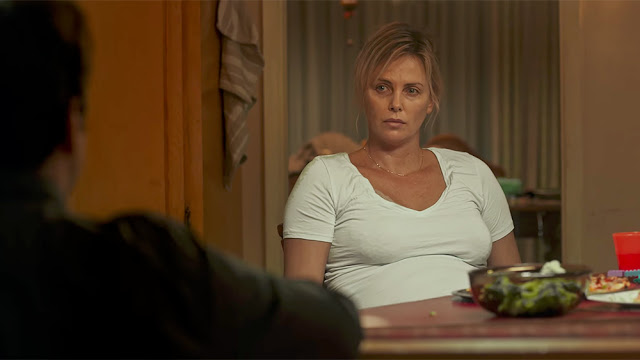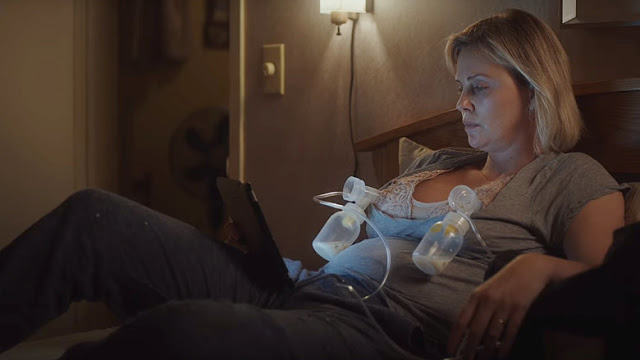Jason Reitman and Diablo Cody are good with words. Reitman’s first feature, Thank You for Smoking, was an acid satire about an amoral lobbyist with the gift of gab; for his next, Juno, he took Cody’s zinger-filled script and turned it into a sweet study of teenage loneliness and connection. But it’s telling that in Reitman and Cody’s subsequent collaboration, Young Adult, the jokes flowed slower as the characters got older, the rapid-fire one-liners replaced by caustic insults and grim observations. The trend continues now with Tully, a warm and thoughtful meditation on family and motherhood that’s less antic but no less resonant. Sonically speaking, if Juno was a clatter of snickers and shouts, Tully is a heavy sigh, the deep breath that you exhale as you collapse onto the sofa at the end of a long, hard, numbingly familiar day.
If this suggests that Tully is a wearying experience, well, it is and it isn’t. Certainly, Reitman and his star, Charlize Theron, articulate the film’s atmosphere of groaning exhaustion with discomfiting clarity. But there is pleasure, too, and not just the satisfaction of watching Theron work. (It is nigh impossible to reconcile the perpetually tired matriarch we see here with the ass-kicking secret agent of Atomic Blonde.) No, the real joy in Tully derives from watching a movie that intimately understands its characters, and that treats them with empathy and generosity.
Those qualities are not immediately visible in Marlo (Theron), who spends the film’s first act alternating between bouts of fatigue and paroxysms of indignation. Marlo isn’t as cutting as Mavis, the self-absorbed divorcée Theron played in Young Adult; still, it’s possible to see Mavis having aged into Marlo, if only life had handed her a few breaks and subsequently sanded down her sharp edges. Here, Marlo seems reasonably well-off: She owns a sturdy home in the New York suburbs, and she has a stable marriage to Drew (Ron Livingston, just right), with whom she has two young children, Sarah (Lia Frankland) and Jonah (Asher Miles Fallica). You might say she’s living the American dream.
Just don’t say so to her face. Opening the movie heavily pregnant with her third child, Marlo shuffles through her white-picket-fence existence with a glazed smile and a zombified stare, just hoping to make it through the day while suffering as few calamities as possible. Complicating matters is Jonah’s undiagnosed developmental disorder—school officials repeatedly label him “quirky”—which makes him prone to tantrums in the car and causes problems in the classroom. (In one of the film’s most bitterly funny scenes, Jonah’s principal suggests to Marlo that what her son really needs is a dedicated student aide, then flatly informs her that the school provides no such aides.)
They say that mothers are superheroes without costumes, and Theron’s performance is heroically unglamorous, illuminating Marlo’s grinding struggle without turning her into a paragon of despondency. (As a testament to her lack of vanity, Theron gained 50 pounds for the role, leading to the movie’s best joke, when Marlo’s daughter asks—with hilarious sincerity—“Mom, what’s wrong with your body?”) And her director paints her as a woman who is simultaneously successful and stuck. Visually, Reitman isn’t much of a showman, but he displays information smartly and efficiently; shortly after the new baby arrives, he serves up a crisply edited montage that conveys Marlo’s drudging day-to-day, a decidedly monotonous routine of pumping liquids, changing diapers, and feeding hungry mouths, whether with breast milk or frozen pizza. What’s a constantly worn-out mom to do?
The answer, Marlo reluctantly determines, is to take the advice of her brother (Mark Duplass), a self-described “rich asshole” who offers to hire her a night nanny. And so one evening, there’s a knock on the front door, and in waltzes Tully, a beaming, free-spirited twentysomething who appears in the sprightly form of Mackenzie Davis. What follows is a swift and startling transformation; with Tully handling housework and other menial tasks, Marlo has the freedom to rest and the energy to treat each new day as a glorious opportunity—is that “Call Me Maybe” I hear on the karaoke machine?—rather than an arduous challenge.
Had it proceeded with a different tone, Tully could have verged on self-pity, a woe-is-me portrait of a privileged family and their thoroughly surmountable problems. (What about the women who don’t have rich-asshole brothers to hire night nannies on their behalf?) But the movie isn’t so reductive. It instead posits that two adages commonly associated with motherhood—that it is the apex of every woman’s journey, and that it is hard fucking work—are not mutually exclusive. As portrayed by Theron, Marlo is neither a selfless saint nor an ungrateful narcissist; she’s just a flawed, decent person with her own needs and desires, which means she can be both a good mother and a bit of a jerk.
“This is me when I’m not licking your asshole,” Marlo spits at Jonah’s principal, briefly shedding her mask of feigned politeness. And the screenplay for Tully is the essence of Diablo Cody when she isn’t preoccupied with developing cutesy quips or T-shirt-ready slogans. Like Juno and Mavis before her, Marlo’s story is one of self-discovery, the tale of a smart and talented woman grappling with who she is, what she has, and why things aren’t quite as she imagined they’d be.
To that end, the central relationship in Tully is the strange, delicate friendship that blooms between Marlo and Tully. Marlo initially regards her effervescent helper with a mixture of disbelief and envy, jealous not just of her youth (both physical and spiritual) but of her apparent liberty. Unlike Marlo, Tully has no obligations—no spouse, no kids, nothing to prevent her from suddenly jetting across the country, or maybe just to Brooklyn for a night of hard drinking. Yet as the film proceeds, the perceived lifestyle gap between the two women slowly closes, with Tully alerting Marlo to the milestones she’s achieved while also revealing her own issues and limitations. And Davis—a terrific actress who is surely inches from superstardom—matches Theron’s soulful lethargy with a marvelous vivacity, complementing her costar without ever threatening to upstage her.
Modestly scaled and competently directed, Tully might risk bordering on unassuming if it weren’t so finely attuned to its setting and its characters. It also delivers a striking third act, complete with a killer reveal that brilliantly recontextualizes much of what came before. (This includes a sex scene that strains credibility in the moment; less effectively managed is a late criminal episode whose resolution is perhaps too easily papered over.) Yet Reitman handles even the film’s big moments with gentleness and grace, as befits its emotional acuity. Tully is the kind of quietly superb movie whose strengths are so steady and subtle, you might not properly appreciate them. In other words: Happy Mother’s Day.
Jeremy Beck is the editor-in-chief of MovieManifesto. He watches more movies and television than he probably should.



